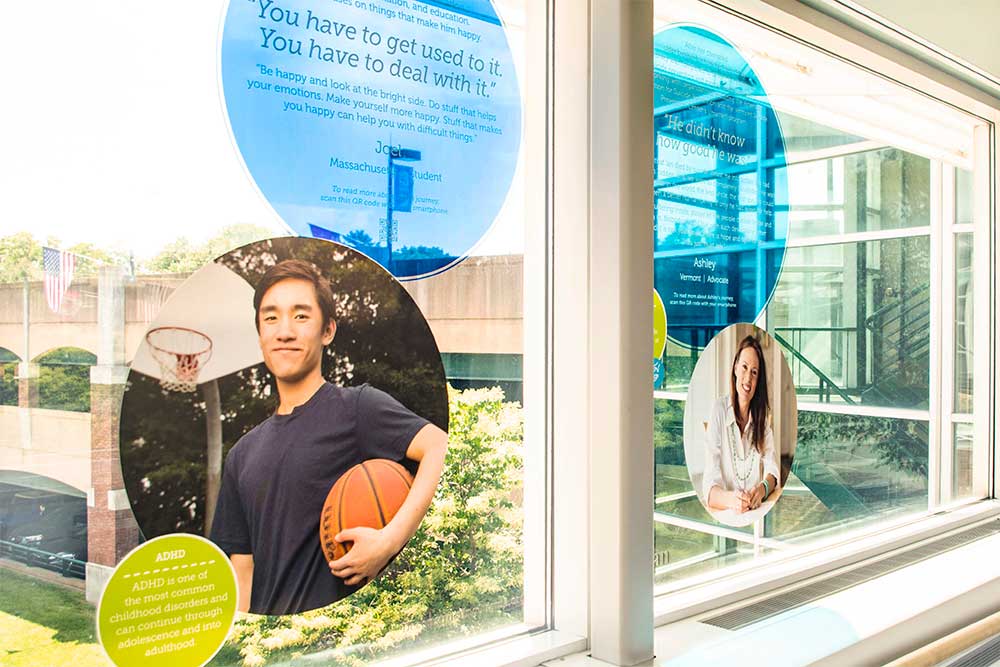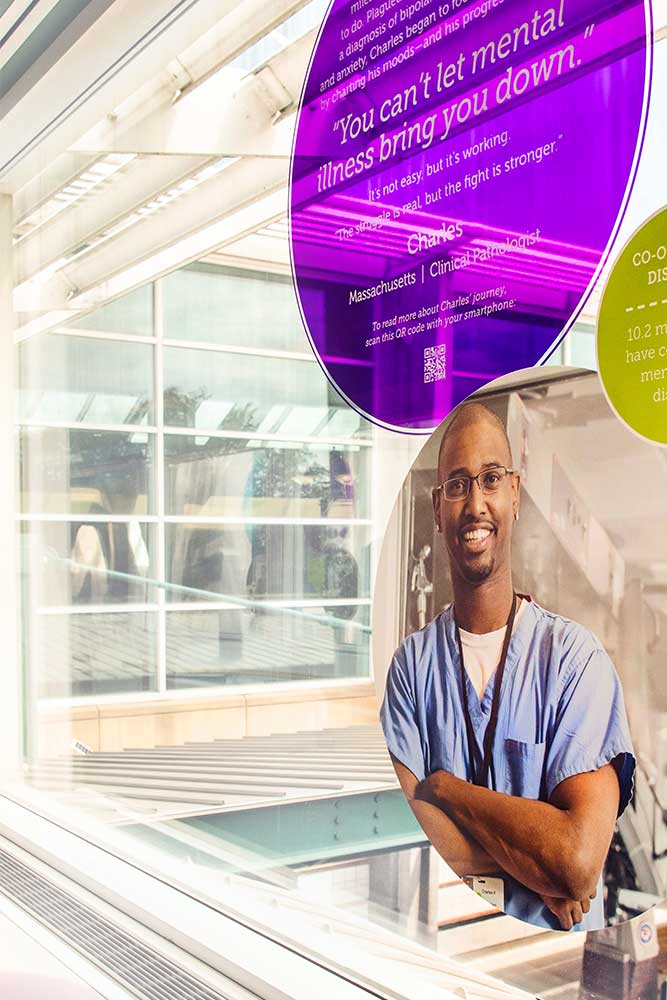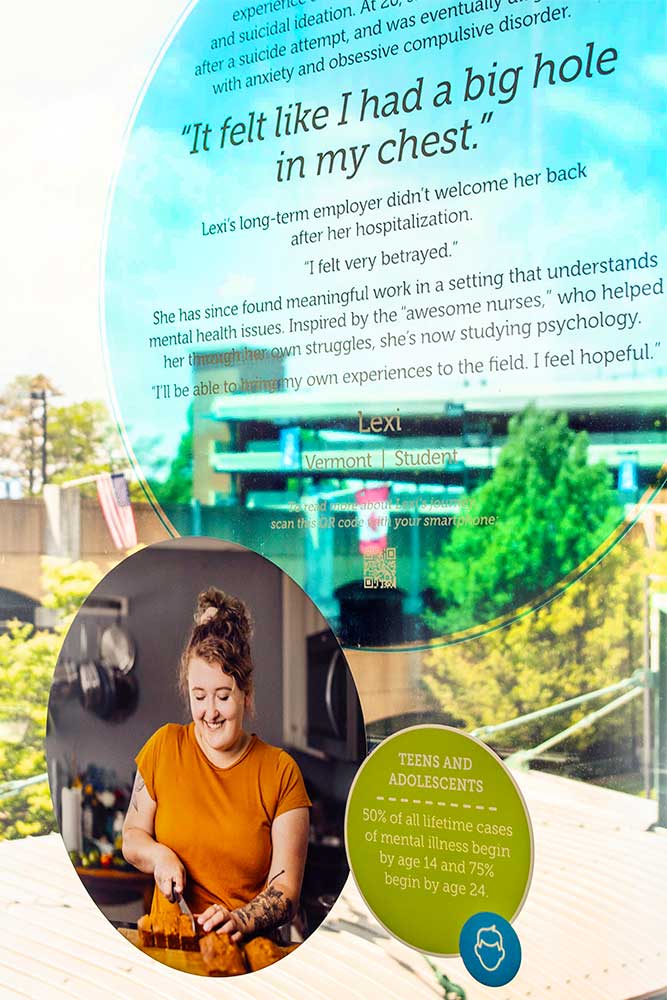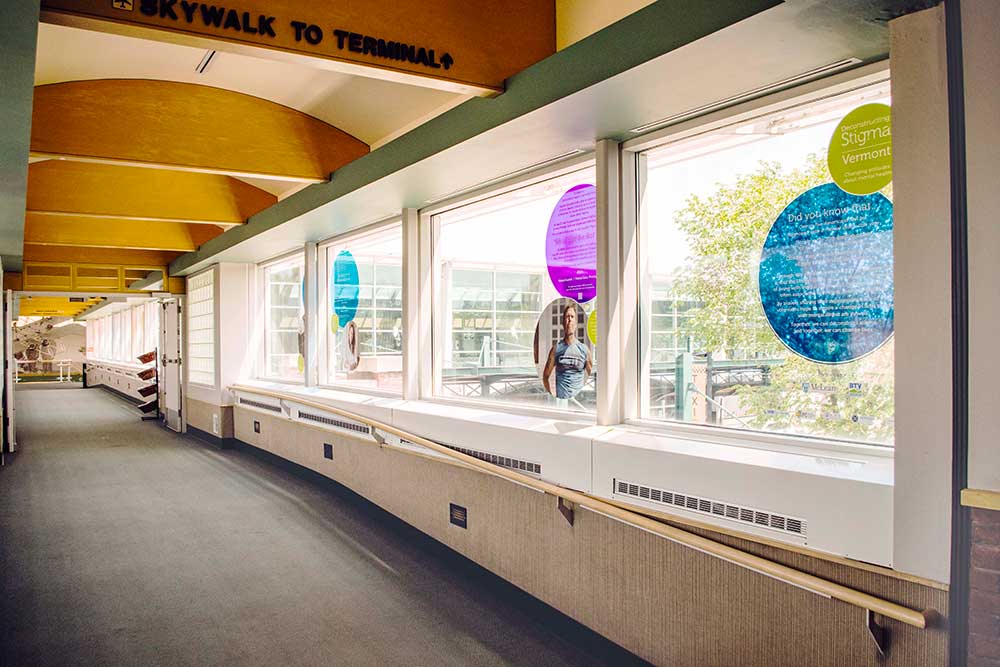With a focus on supporting the local community, including those who struggle with mental health and substance use disorders themselves or in their families, Burlington International Airport (BTV) welcomed McLean to develop a Vermont-focused Deconstructing Stigma exhibit.
In a hands-on collaboration, McLean and BTV worked together to create the first-of-its-kind display that is visible to all visitors to the airport who travel through the more-than-100-foot walkway between the parking garage and the airport.

How Did McLean Meet BTV?
After reading the Boston Globe story about the Deconstructing Stigma collaboration with Logan Airport, Ashley, who had recently lost her brother Ian to suicide, felt compelled to call McLean and ask the hospital to forge a similar partnership with BTV.
That one phone call resulted in a unique collaboration between McLean’s Deconstructing Stigma team and BTV.


The Burlington International Airport has welcomed McLean to share the hospital’s award-winning public awareness campaign, Deconstructing Stigma. The exhibit, which has been developed specifically for the airport, features men and women from Vermont who have experienced mental health challenges themselves and in their families.
The volunteers in this campaign are wildlife advocates, musicians, fitness instructors, actors, athletes, and artists. They are sisters and wives, brothers and fathers. What do they have in common? All have been affected by mental health and the stigma that surrounds it and have been brought together as part of Deconstructing Stigma.
Changing Attitudes About Mental Health
Among the people profiled in the exhibit, which spans the length of a walkway that sees hundreds of thousands of visitors a year, is Tian, a social worker and student who believes that being part of a supportive community provides the strength and encouragement that is needed for someone who lives with a mental health condition to thrive.
“I strongly believe in community, and even though treatment is what got me out of the hospital and back into the real world, my community is what allows me to stay, experience, and grow in it,” said Tian.

Tian chose to share her story at BTV because she wants other people to know that there is no shame in admitting you need help.
Tian is not alone in this thought.
Each of the volunteers from Vermont and beyond shares their story to encourage others to seek care and to know they are not alone. Though each person is unique, and their story is personal, the experiences of coping with mental health and stigma are similar. The goal of Deconstructing Stigma is to share the individual voices and, by doing so, highlight the commonality that all of us share—mental health affects everyone.
Facts About Mental Health in Vermont
- In 2016, suicide was the 8th-leading cause of death for all Vermonters
- Over the past two decades, trends in death by suicide have increased in Vermont and the United States
- In recent years, more than 100 Vermonters have died by suicide each year
- The percentage of Vermont adults with any mental health condition is generally higher than corresponding rates in the US and Northeast
- More Vermont adults are getting treatment than the national average (58% vs. 43% in 2015); other data sources—such as data reported to SAMHSA’s Uniform Reporting System (URS)—show that Vermont’s use of community mental health services is much higher than the national average (39 per 1,000 people vs. 23 per 1,000 people in 2015)
- In Vermont, about 6,000 adolescents aged 12-17 (12.7% of all adolescents) per year in 2013-2014 reported using illicit drugs within the month prior to being surveyed
- In Vermont, about 7 in 10 (68.8%) adolescents aged 12-17 in 2013-2014 perceived no great risk from having five or more drinks once or twice a week—higher than the national percentage
- In Vermont, about 23,000 adults aged 18 or older (4.7% of all adults) per year in 2013-2014 had serious thoughts of suicide within the year prior to being surveyed
- In Vermont, per year from 2010 to 2014, about 57,000 adults aged 18 or older with mental health conditions (57.7% of all adults with mental health concerns) received mental health treatment/counseling within the year prior to being surveyed
Get Support
Many organizations throughout Vermont offer support and services to individuals and families in need. Find Vermont-specific resources.
